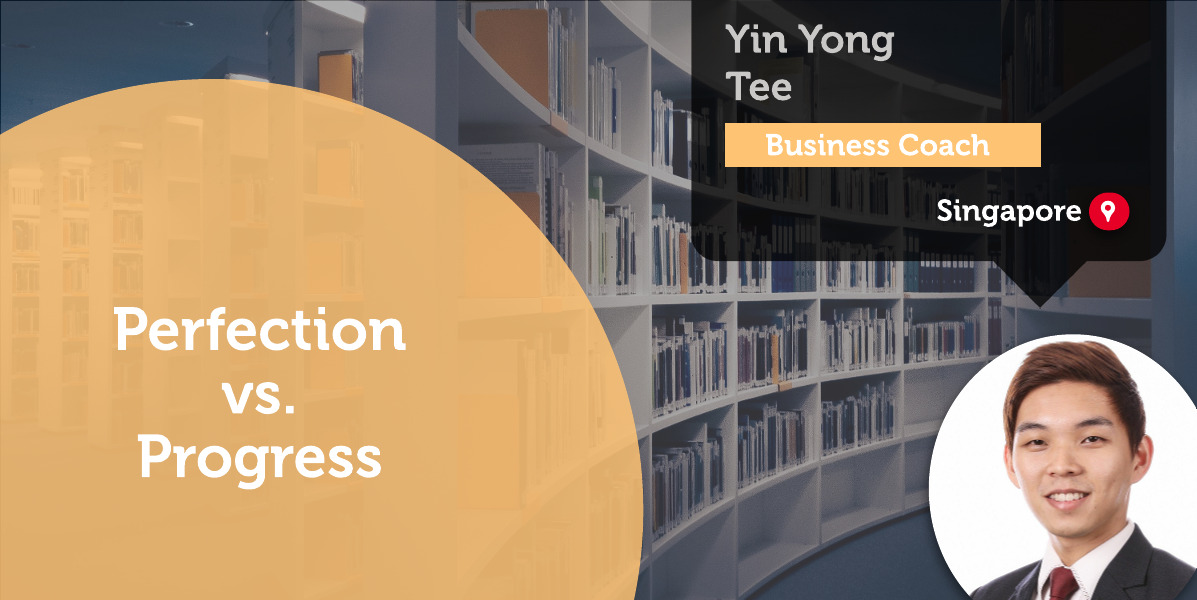A Coaching Power Tool By Yin Yong Tee, Business Coach, SINGAPORE

Perfection vs. Progress – People Aiming for Perfection Rather Than Progress
Perfection is the enemy of progress. Winston Churchill
Have you ever dreaded starting on a piece of work because you are afraid that it will not be perfect if you do not think of every step or scenario that could go wrong?
Our society has conditioned us to aim for perfection in everything that we do. From getting the perfect full marks in an exam to finding the perfect partner as seen in romantic movies.
In today’s technologically advanced world, everyone has the tools and access to information for our decision-making. Although this seems to be a great blessing for us, often, this results in people aiming for perfection rather than progress.
Perfection vs. Progress Explanation
Perfection
The consequences of aiming for perfection create fear in us. We fear making a mistake in our report, missing out on an item in our party planning, or sometimes just the fear of failure if we try something new.
When we are stuck in this mindset of striving for perfection in all that we do, we put ourselves in a high-stress environment that impedes our progress. The fear of not getting the result perfect causes some to procrastinate instead. Sometimes we even self-justify that we are simply trying to plan out all the risks and scenarios.
In today’s volatile, uncertain, complex, and ambiguous (VUCA) world, this mindset of perfection often yields the opposite impact we seek for. Due to the complex nature of problems, we face today, aiming for perfection is no longer a viable option as others adopt an iterative approach in their way of working.
Rather than be fixated on perfection, we should try to understand what is the outcome we seek to achieve. This can be applied to all aspects of our lives, ranging from our work to planning our kid’s birthday parties. Once we can overcome the inertia of being perfect and ask ourselves the question: “What do I need to do first to achieve this outcome”, we are on track to getting started.
Progress
Done is better than perfect. – Sheryl Sandberg
Progress, as defined in Merriam-Webster, is
- to move forward: proceed
- to develop to a higher, better, or more advanced stage
For many of us who seek coaching, progress definition can be seen as the outcome we strive for. The ability to move forward and develop ourselves to someone better. Once we can shift our mindset from striving for perfection to striving for progress, we remove the fear of failure as even the smallest action step allows us to make progress in our goals.
In this new perspective towards progress, we begin to break down giant projects and goals into smaller tasks that we can kick-start. The beauty of the progressive mindset is that we are continuously in our journey of progress and through this journey, we will achieve much more than we can imagine.
The three key steps for progress involves:
- Identify the goal we seek to achieve
- Plan out the next step that would move us towards this goal
- Act upon the next step and iterate from there
Clients need to understand that progress can be made one step at a time as long as there is value being achieved for themselves. Instead of focusing on the big milestones, we can instead turn our attention to celebrating quick wins.
Perfection vs. Progress Mindset as a Coach
The understanding of a Perfection vs. Progress mindset as a coach allows us to invoke awareness within our clients when appropriate.
When faced with clients that are focused on a perfection mindset, we can ask questions that allow them to understand what they are aiming to achieve. By allowing them to reflect on their objectives, it enables them to take a step back and review their goals. During this time, we can also focus on working out the various “What ifs” with the clients. By listing out all these, we can help the client to think of potential solutions to reduce their fear of getting started. We can also support them in understanding if there are assumptions or hypotheses made in their understanding of the situation. These small steps will help the client to shift away from a perfect mindset towards progress.
Once we shift their focus away from perfection towards progress, we can then work towards their goals through the exploration of their ideas and actions plan. In subsequent sessions, we can work with them to focus on what they learned based on their initial action plan.
The key here is to shift their mindset towards reflection and adaptation as they work towards their goals. Questions that could be asked for this include:
- What have you learned from making the first step?
- What are the other actions you can think of now for your goal?
- How does your current understanding of the situation serve you for the plan?
Allowing our clients to reflect and acknowledge themselves for the steps they have taken towards progress will help them to understand the importance of a progress mindset over a perfection mindset. The beauty of the progressive mindset is the ability for it to apply to various aspects of our client life. They can apply it to their personal life and even support themselves in building healthy habits if needed.
As coaches, we seek to invoke our client’s awareness as they shift their mindset from perfection to progress and enable them to make continuous progress towards this shift.